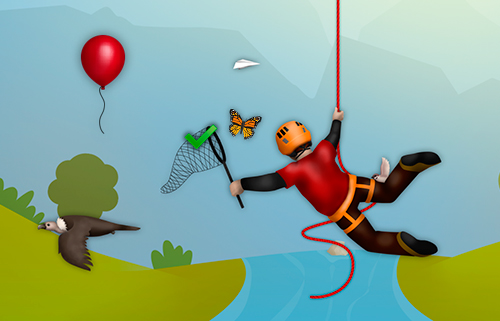
Multi-platform
Brain Game: Butterfly Hunter
Online brain training game
Play "Butterfly Hunter" online and boost cognitive skills
Get access to this scientific brain training
Challenge your brain
Butterfly Hunter is a brain training game that activates different cognitive skills In order to advance in the brain game the user needs to capture as many butterflies as possible while avoiding collision with other animals. As you progress through the levels, you'll be using more parts of your brain and the cognitive challenge will be even greater.
This brain game will automatically become more difficult to suit the user's cognitive level. Butterfly Hunter is a scientific resource designed to continuously measure cognitive performance, and automatically adjust the difficulty to optimally train cognitive skills. The brain game Butterfly Hunter is suitable for children and adults to train and activate essential cognitive skills.
How can "Butterfly Hunter" improve your cognitive abilities?
When you activate a cognitive ability in the brain, neural patterns activates.
1st WEEK
2nd WEEK
3rd WEEK

Neural Connections CogniFit
What cognitive abilities can you improve with "Butterfly Hunter"?
The cognitive abilities that you can help improve with this brain training game are:
- Reaction Time:In this brain game, the user has to catch the butterflies on the screen before they disappear, which is why it's important to have good reflexes and catch them before the fly away. This game will help train and strengthen the brain areas used in reaction time. Improving this cognitive ability makes it possible to be more efficient when responding to stimuli and situations. For example, when someone asks you a question in an interview, you hope you'll be able to answer quickly and appropriately.
- Hand-Eye Coordination:This mind game was designed to make the user move the butterfly catcher to where the butterflies are while avoiding distracting stimuli. Doing this activity activates hand-eye coordination. Improving this cognitive ability can make you more efficient in a number of daily activities, like when you have to open a can or unscrew a jar.
- Spatial Perception:As the user moves throughout the screen catching butterflies, they will need to be able to use their spatial perception to determine the space and use it well. Doing this uses and trains spatial perception. Improving spatial perception can help you be more diligent when moving in the space around you, helping to avoid crashes and accidents with the objects in your environment. This skill is especially important when driving, as it helps you determine the space you have to park, for example, keeping you from hitting the car next to you.
Other relevant cognitive skills are:
- Visual Perception: In the brain game Butterfly Hunter, the user must identify each of the flying objects that appear on the screen. This quick type of visual identification helps improve and strengthen the areas used in visual perception. Improving this ability can make certain daily tasks easier when it comes to interpreting information from the environment, like identifying letters or objects more efficiently.
- Visual Scanning: In order to successfully complete each level , the user will have to search and locate the target objects from the irrelevant objects. This exercise will train visual scanning, and improving it may help you learn to quickly and efficiently locate relevant information in your surroundings. This cognitive skill is especially important for athletes or drivers, as it allows them to correctly interpret a stimulus.
- Focused Attention:In this brain game, it's important to be able to detect and recognize the target stimuli, responding to them quickly and efficiently, while ignoring and avoiding distracting stimuli. Doing this helps train focused attention, and improving this cognitive ability helps minimize distractions and makes you more efficient in daily activities that require this attention ability.
What happens if you don't train your cognitive skills?
Our brains are designed to reserve resources, so it eliminates the neural connections that it doesn't use often. This is why if a certain cognitive skill isn't used frequently, the brain will stop sending it the resources it needs and it will become weaker and weaker. This weakening of the neural connection makes it more difficult and less efficient when using a certain cognitive skill, making you potentially less efficient in your daily life.



